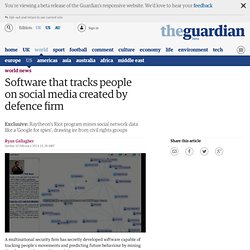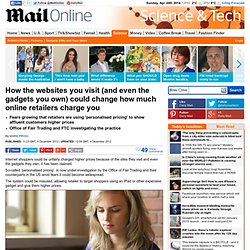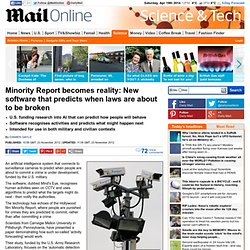

NEW RESEARCH: More than half of the top 100 URLS are tracking you. You’ve probably never heard of most of the 100 top URLs in world.
In fact, most users have no idea that they’ve even accessed most of the 89 domains the average user interacts with in a month. A new F-Secure Labs study of the top 100 URLS accessed by customers all over the globe shows that of the world’s top URLs only 15% were accessed directly. The remaining 85% were accessed by other websites or software on the users PCs. Of the 85% accessed automatically, 10% come from ad-serving domains, 35% are ad-serving domains with tracking components and 19% are purely tracking domains.
This means that at least half of the URLs your browser accesses are not providing you any content. “We are more honest with search engines than we are with our families,” F-Secure Chief Security Officer Mikko Hypponen said recently. But the NSA, Google and Facebook aren’t the only ones tracking your online behavior. NSA 'intercepting millions of images per day to create facial recognition database' US National Security Agency collecting 55,000 'facial recognition quality images' per day out of millions being interceptedFacial recognition program accelerated under Obama administration after foiled terror plotsNSA: No access to state ID pictures or passports of American citizens By Kirk Maltais Published: 14:27 GMT, 1 June 2014 | Updated: 21:15 GMT, 1 June 2014 The NSA is building a comprehensive facial recognition database through the intercepting of millions of photographs posted online everyday, according to a report from the New York Times published Saturday.

According to the report, which cites top-secret documents leaked by former NSA contractor Edward Snowden, the NSA intercepts 'millions of images per day', which translates into approximately 55,000 'facial recognition quality images.' According to a 2011 document cited in the report, this is regarded by the agency as 'tremendous untapped potential'. NSA Headquarters, in Fort Meade, Maryland. Pentagon designing satellite that can spy on 40% of the Earth at once. Membrane Optical Imager for Real-Time Exploitation (MOIRE) uses a massive web of thin membranes instead of heavy lensesIt is being developed by Pentagon's DARPA future weapons agencySatellite will have 68-foot lens - dwarfing Hubble, which is only eight feet By Daily Mail Reporter.

Darpa's Giant Folding Spy Satellite Will Dwarf All Other Space Telescopes. Photo: Darpa Spying could become much easier if a new lightweight, folding satellite concept gets off the ground.

Darpa, the military’s futuristic research agency, says it has plans to “break the glass ceiling” of space telescopes by shooting a new design into orbit that’s made of plastic and unfolds into a mammoth satellite that would dwarf the world’s most famous telescopes. Darpa’s Membrane Optical Imager for Real-Time Exploitation (MOIRE) program redesigns the traditional glass telescope into an orbital telescope that’s bigger and lighter than previous imaging satellites, making it easier to spy on larger areas and for longer periods of time. Launched as a tightly packed cluster of petals 20 feet in diameter, MOIRE stretches to 68 feet across once it reaches 22,000 miles above the earth.
Software that tracks people on social media created by defence firm. A multinational security firm has secretly developed software capable of tracking people's movements and predicting future behaviour by mining data from social networking websites.

A video obtained by the Guardian reveals how an "extreme-scale analytics" system created by Raytheon, the world's fifth largest defence contractor, can gather vast amounts of information about people from websites including Facebook, Twitter and Foursquare. Raytheon says it has not sold the software – named Riot, or Rapid Information Overlay Technology – to any clients. But the Massachusetts-based company has acknowledged the technology was shared with US government and industry as part of a joint research and development effort, in 2010, to help build a national security system capable of analysing "trillions of entities" from cyberspace. Using Riot it is possible to gain an entire snapshot of a person's life – their friends, the places they visit charted on a map – in little more than a few clicks of a button.
'Google for spies' software mines social networks to track users' movements and could even predict what you'll do next. How the websites you visit (and even the gadgets you own) could decide how much retailers charge you. Fears growing that retailers are using 'personalised pricing' to show affluent customers higher pricesOffice of Fair Trading and FTC investigating the practice By Mark Prigg Published: 11:23 GMT, 4 December 2012 | Updated: 12:09 GMT, 4 December 2012 Internet shoppers could be unfairly charged higher prices because of the sites they visit and even the gadgets they own, it has been claimed.

So-called ‘personalised pricing’ is now under investigation by the Office of Fair Trading and their counterparts in the US amid fears it could become widespread. The system could be misused, allowing retailer to target shoppers using an iPad or other expensive gadget and give them higher prices. Fears are growing that retailers could use browsing history and even the gadget used to adjust pricing Consumers visit a site and search for a particular product. Their interest is recorded in a 'cookie', a small file on their computer, and may be shared with other sites. Minority Report becomes reality: New software that predicts when laws are about to be broken. U.S. funding research into AI that can predict how people will behaveSoftware recognises activities and predicts what might happen nextIntended for use in both military and civilian contexts.

The 'creepy' mannequin that stares back at you: Fashion retailers adapt airport security technology to profile customers. Mannequins have cameras instead of eyes to monitor people as they shop Campaigners denounce 'creepy' move and claim it is profit over privacyEyeSee dummies, made in Italy, and are in use in Europe and the U.S.Makers want to update technology to EAVESDROP on what customers say.

'Revolutionary' technology could allow governments to listen in on your Skype conversations. Until now voice-over internet services have been difficult for police to tap The technology is latest to offer governments a way to intercept web chats By Damien Gayle Published: 13:11 GMT, 21 November 2012 | Updated: 16:07 GMT, 21 November 2012 New eavesdropping technology could allow government agencies to 'silently record' conversations on internet chat services like Skype in real time.

Until now, so called voice over internet protocol (VoIP) services have been difficult for police to tap into, because of the way they send information over the web. The services convert analogue audio signals into digital data packets, which are then sent in a way that is costly and complex for third parties to intercept. Dennis Chang's VOIP-Pal aims to help law enforcement monitor Skype, other Internet chats. Photo by KIMIHIRO HOSHINO/AFP/Getty Images According to law enforcement agencies, the rising popularity of Internet chat services like Skype has made it difficult to eavesdrop on suspects’ communications.

But now a California businessman is weighing in with what he claims is a revolutionary solution—a next-generation surveillance technology designed to covertly intercept online chats and video calls in real time. Ryan Gallagher is a journalist who reports on surveillance, security, and civil liberties. Follow Voice over IP chat software allows people to make phone calls over the Internet by converting analog audio signals into digital data packets. In response, technology companies have rushed to develop new surveillance solutions. With this technology, suspects whom authorities wanted to monitor could be identified through their username and subscriber data. Governments across the world are concerned about how the Web is impacting their ability to conduct surveillance. 'Government surveillance is on the rise' says Google as report shows it has been asked to reveal more user data than ever.
U.S. tops snoopers' league table, with nearly 8,000 requests for user dataUK comes in sixth - behind Germany and France - with 1,425 requestsReport also reveals a spike in requests to remove content from servicesRequests for content removal by UK authorities have nearly doubled By Damien Gayle Published: 12:31 GMT, 14 November 2012 | Updated: 16:11 GMT, 14 November 2012.
FBI Wants Backdoors in Facebook, Skype and Instant Messaging. The FBI has been lobbying top internet companies like Yahoo and Google to support a proposal that would force them to provide backdoors for government surveillance, according to CNET. The Bureau has been quietly meeting with representatives of these companies, as well as Microsoft (which owns Hotmail and Skype), Facebook and others to argue for a legislative proposal, drafted by the FBI, that would require social-networking sites and VoIP, instant messaging and e-mail providers to alter their code to make their products wiretap-friendly. The FBI has previously complained to Congress about the so-called “Going Dark” problem – the difficulty of doing effective wiretap surveillance as more communications have moved from traditional telephone services to internet service companies. Under the Communications Assistance for Law Enforcement Act, or CALEA, passed in 1994, telecommunications providers are required to make their systems wiretap-friendly.
We're watching: The camera that can recognise you from your Facebook picture every time you walk into a shop. Firefox Add-On Collusion Shows Who's Tracking You Online. If you're concerned about advertisers tracking you across the Web, Mozilla can now help you see exactly who's following you online with a new experimental Firefox add-on called Collusion. The browser extension creates a real-time graph of all the tracking cookies being deposited on your browser as you move around the Web.
The add-on can differentiate between behavioral tracking (cookies that record links you click on, what content you view, searches you make on a site, etc.) and other potential tracking cookies. Mobile phone companies can predict future movements of users by building a profile of their lifestyle. Your future location is calculated using data from your phoneUniversity of Birmingham team made location predictions of users with an error margin of just 60ft If developed, it can be used for personalised marketing, but has been accused of invading privacy.